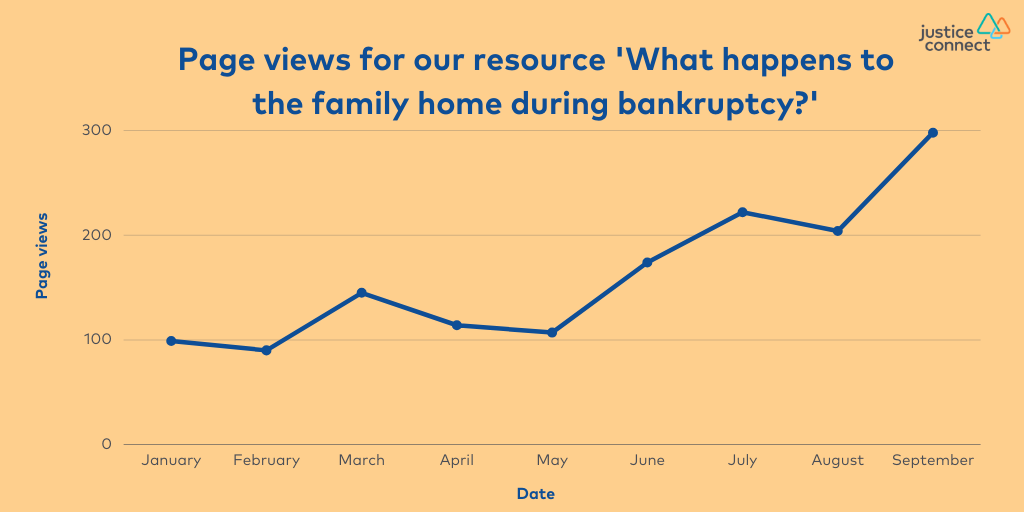Insights from our September COVID-19 response
12 Nov 2020
We’ve continued to run all our legal services throughout the COVID-19 pandemic, as well as launching new interventions to meet the rise in legal need in the community. We’re designing these responses according to the qualitative and quantitative data we collect.
This update will be focusing on our work responding to individual legal matters in September. You can review findings from previous months by reading our Fair Matters blog posts.
Our data on demand for legal help in September
38,208 users accessed our website in September, which was less than August but still above our website average. As Victoria re-entered lockdown, we saw sustained interest in our resource on Emergency Powers in Victoria.

This continued high-volume of traffic was in part due to the Victorian Government exploring options to extend emergency powers in Victoria, which was announced in late August and referenced in our August blog post. As the coronavirus state of emergency extension was passed in the Victorian parliament at the beginning of September, we saw significant traffic towards our emergency restrictions resources.

How people found our resources in September
Traffic to our self-help resources remained consistent with previous months. We saw sustained interest in our Victorian Emergency Restrictions resource as the restrictions were extended. We also saw high interest in our ‘How does COVID-19 affect Victoria renters?’ resource, followed by resources on emergency powers in other states, as well as resources on bankruptcy, debt collection and accessing courts.

Our high-volume of traffic from Victorians indicates that the second round of lockdown impacted Victorians financially, and is having flow-on effect on people’s ability to pay rent and keep up with their existing debts. In response to this, we’re planning to expand our range of financial resources, including information on mortgage defaults.
In September, 63% of traffic to our website coming through organic search. September’s top search terms (removing ‘Justice Connect’ and other terms directly searching for the organisation) were:
- “State of Emergency Vic”
- “What does State of Emergency mean”
Our top growing search inquiries (compared to August) were:
- “State of Disaster Victoria”
- “Tenant eviction Victoria”
Our paid search was very successful in September with a 277% increase in traffic. Our Victoria Emergency Powers resource received 5,618 clicks through ads, which was a 13.43% click through rate. People also found us by online referrals via VCAT, Federation of Community Legal Centres, Legal Aid Victoria, Victorian Bar and Consumer Affairs Victoria.
In September many tenants had to negotiate new rental reduction agreements
The Victoria’s COVID-19 tenancy laws applied until September, so many renters who negotiated rent reduction agreements or had orders made through conciliation were facing uncertainty as those agreements were due to expire around the end of the month.
Many renters were trying to extend their rent reduction agreements with their landlords. Insights from our case work revealed that some renters were asking to have their rent reduction agreements extended, only to receive an application for a termination of their tenancy from their landlords hoping to evict them instead.
The expiry of these existing agreements coincided with a cut to both Jobseeker and JobKeeper. Which created additional stress and uncertainty for Victorian renters.
We saw a new cohort of renters who had spent the early months of the COVID-19 pandemic scraping by to afford their ordinary rent while receiving JobKeeper or JobSeeker. When the government reduced both support payments, this same group of people were applying for a rent reduction for the first time during the pandemic.
While legal need across tenancy matters remained high, we saw a plateau in page views for Dear Landlord in September. Unfortunately, we expect that traffic to this resource will continue to increase as more people face the long-term financial impacts of COVID-19. The slight plateau this month may have been due to a slight dip in promotion news post our initial re-launch.

September saw a slight decrease in matters related to eviction and eviction due to rental arrears. 60% of tenancy enquiries to our Homeless Law team were related to eviction — a drop from 75% in August. However, tenancy and eviction remain prominent issues. We saw an increase in the number of enquiries our services received in September (139) compared to August (121). Interestingly less people identified that they were affected by COVID-19 in September (16%) compared to August (31%).
Using data from our digital and frontline services, we are currently advocating in relation to the transition from COVID-19 tenancy protections to the new Residential Tenancies Amendment Act.
Given the ongoing economic impacts of COVID-19, there will be a greater need for transitional tenancy and financial protections to ensure tenants can remain safely housed. The Federal government anticipated cuts to JobKeeper and JobSeeker will push people further under the poverty line.
We’re keeping an eye on bankruptcy
In September, limitations on bankruptcy and debt collection were still in place. Because of this, legal matters related to bankruptcy proceedings should have remained low. However, bankruptcy enquiries actually increased in September (from 4% of our Federal Self Representative Service enquiries in Aug to 12.5% in September).
This increase in enquiries was not necessarily related to new bankruptcy matters — which limitations on bankruptcy and debt collection are currently preventing — but rather related to the progression of pre-existing bankruptcy matters. Lawyers in our Self Representative Service noticed an increase in matters related to trustees seeking to sell bankruptcy properties, as noted in our August insights. While these are not strictly COVID related, we speculate that trustees are moving forward on selling bankrupt properties in the absence of opportunities to pursue bankruptcy against new parties.
In response to this insight, we updated our resource “What happens to the family home during bankruptcy” to include COVID-19 related wording. Traffic to this resource has been steadily increasing over the course of the year. In September, unique page views increased by 46% compared to August.

The increased movement in the bankruptcy area is concerning as COVID-related protections are in place until end of year. We’ll continue to monitor the trends around bankruptcy and financial issues.


